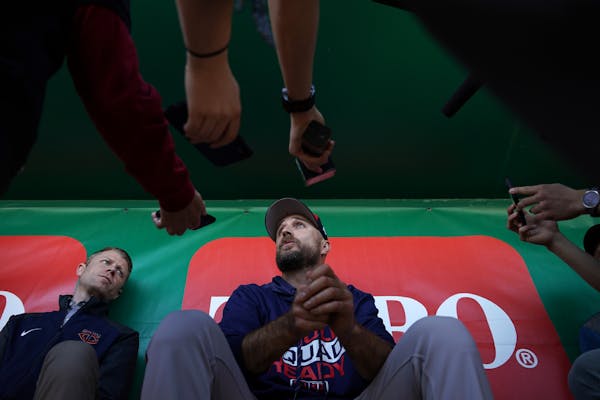FORT MYERS, Fla. – You've probably noticed all the candidates declaring their intention to seek the top job lately, even though the decision won't be put to a vote for a long time. Sure are a lot of them this year, aren't there? Seems like way more than usual.
Yep, the campaign is already underway … to become the Twins' new closer.
"Of course, of course. If the opportunity is there, I'd like to be that guy," said lefthander Taylor Rogers.
"I've done it before, and I'd love to do it again," declared Trevor Hildenberger.
"It's something I want to do. If I'm going to be in the bullpen, I'd like to close," countered Trevor May. "I feel like I have the potential to really thrive in that job."
It's quite a debate, and that's only half the field as the first primaries — er, Grapefruit League games — rapidly approach. Also on the ballot: Veteran Addison Reed, who owns four times as many career saves as the rest of his teammates combined. Newcomer Blake Parker, who earned 14 saves last season while with the Angels, more than any other candidate. And Fernando Romero, the dark horse in the field, who probably wields the most velocity on the mound, a significant advantage in the modern game.
Unlike that other campaign that's getting a lot of attention these days, there is no incumbent for this large field to try to unseat. Last winter, Derek Falvey and Thad Levine chose to bring in an established closer, Fernando Rodney, but they jettisoned him to Oakland in August when his 25 saves couldn't keep Minnesota in the postseason race. This year, the Twins' decisionmakers decided to trust that Rodney's successor is on the current roster. They're just not sure where.
"When Joe Nathan came over [to Minnesota in a 2003 trade], he wasn't a closer. He wasn't the lead guy, and he turned into maybe the best closer in Twins history," said Falvey, the team's chief baseball officer. "Someone needs to grow and mature into that role, and unless a guy is given that opportunity, I'm not sure you're going to know if someone could. So that's an important decision for this team."
Actually, the first decision might be whether the job will exist at all. Manager Rocco Baldelli was hired away from Tampa Bay, where the Rays became famous for unconventional thinking about pitcher's roles. Pitching coach Wes Johnson last worked at the University of Arkansas, where he gained a reputation for data-based decisionmaking.
Meanwhile, the notion of limiting a reliever to save situations almost exclusively has become rote over the past four decades, the very definition of conventional. Are the data-driven Twins planning to change the traditional closer usage?
Check back in three months.
"It could play out a lot of different ways," Baldelli said. "The goal is to put our guys in the best possible spot to help us win games. … Now, guys like to know their roles. I've heard many people say, 'It helps me to prepare and do a good job when I know when I'm getting ready to pitch.' I get that. So we could end up in a situation where guys do have more defined roles at some point — or we might not."
And perhaps it doesn't matter. Levine pointed out that Rogers, who didn't allow a run after July 28, arguably was the Twins' best reliever in 2018, but "saved" only two games.
"We don't believe the closer is always pitching the most vital innings in a game," Levine said. "We've got the advantage of flexibility with what I believe will prove to be a wealth of players who can deliver the critical outs."
They have a wealth of different ways to do it, too. Rogers is the lone lefthander, in possession of a late-breaking slider he can sneak over the plate or use to get ground balls. Parker owns a split-finger pitch that drops out of the strike zone, generating plenty of awkward swings and weak ground balls. Hildenberger is a sidearm specialist whose fastball reaches only the low 90s, but spins away from righthanders. Reed has a curveball that serves as a good counter to his fastball. May has mid-90s heat, which he hopes climbs even higher now that he's had Tommy John surgery, and Romero, a converted starter, can hit 98 mph with his fastball.
"Goose Gossage, he was a hard thrower, but [Trevor] Hoffman hit them with a changeup. Mariano Rivera threw 92 [mph], but had a cutter you couldn't hit," Johnson said. "We're not saying we've got to find a guy who throws 100. We're looking for the guy who can get big outs. Whether that be by striking guys out, or by getting ground balls, whatever it may be, we're ready for anything."
And anybody.
"Each one of those guys has told me independently, 'I'm willing to do whatever you ask,' " Johnson said. "Pitch to certain matchups, pitch in the ninth inning, pitch in the sixth inning. That's a great situation to have."
Movie Review: Prepare to get hot and bothered with stylish, synthy tennis drama 'Challengers'
Havertz scores 2 as Arsenal routs Chelsea 5-0 to cement Premier League lead
Defensemen injuries are already piling up early in the NHL playoffs
Analysis: The IndyCar season has just started but free agency is in full swing after only 2 races

